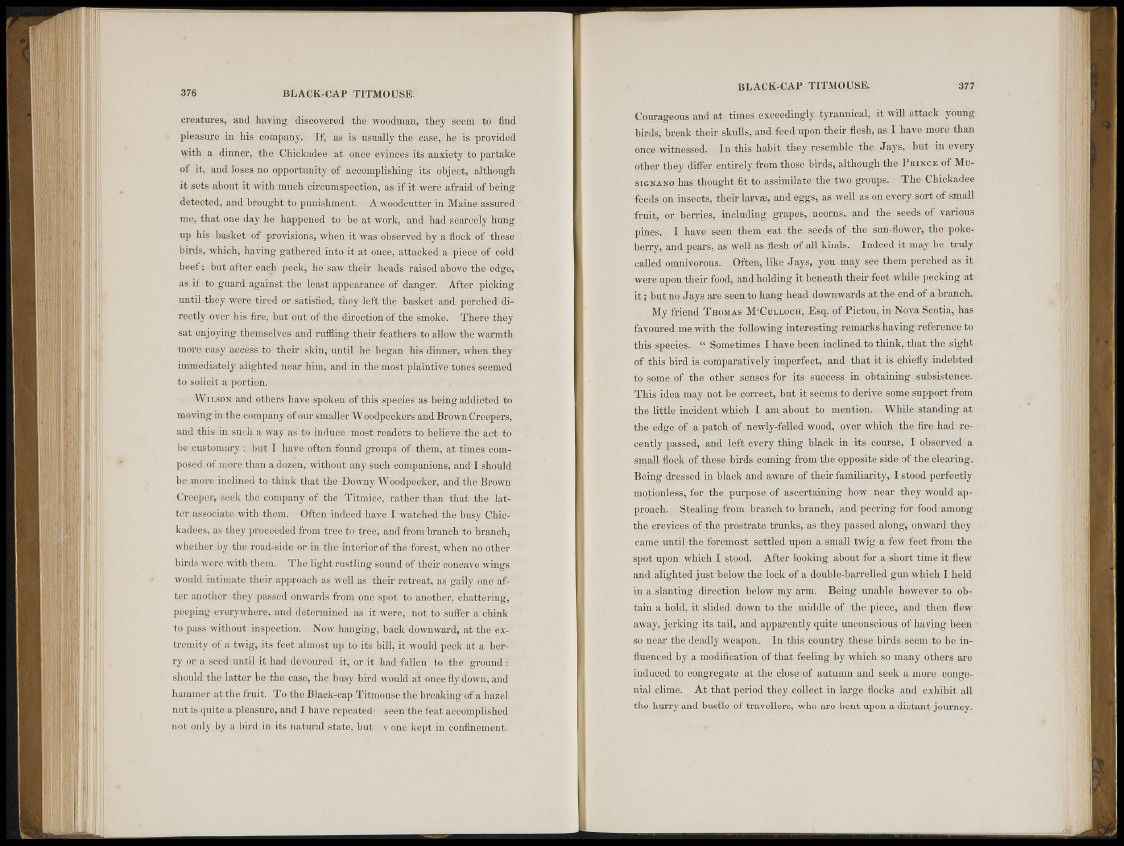
376 BLACK-CAP TITMOUSE.
creatures, and having discovered the woodman, they scorn to find
pleasure in his company.'. • If, as is usually the case, he is |irovidcd
with a dinner,. .the Chickadee at oncc evinces itfs anxiety to partake
of it, and loses no opportunity of accomplishing its object, although
it sets about it with much circumspection, as if it were afraid of being
detected, and brought to punishment. A woodcut tor in Maine assured
mo, (hat (aie day he happened to bo at work, and had .Scarcely hull},'
up his basket of provisioned/when it was observed by â flo'ck. of these
birds, which, having gathered into it at once, attacked » piece: of cold
bséifc: but after oiich peck, he saw their heads raised above the odife,
as.- il ïj, guard against the least appearance fill danger. After picking
untij.they were tired or satisfied, they loft the basket and perched directly
over b|feifir:e,,/but.out of the direction of the smoke. There they
sat enjoying-themselves and ruffling their feathers to allow tke warmth
more easy access to their skin, until he began Ms dinner, when they
immediately alighted near him, suit-MIn 1I10 most plaintive tonesïfëëmed
to solicit a portion.- '.1
Wilson and others have spoken of' this species as being addicted to
moving in the eompanyffioiir smaller Woodpeck'ers and Iironn Creepers1,
and this in su h a way as#j> induce most readers t" believe the act. "to
be customary but. I havS-often found-groups of them, at times com -
posed of more than adozen, without any such companions, and I should
bo inore inclined to;..think that tin- Downy Woodpecker, and the Brown
Creeper, seek the company of the Titmice, rather than that the latter
associate with Uu-ni. Often indeed have I watched the busy ChigB
ksidoos, as they proceeded from tree to tree, and from branch to branch,
whether,By the road side or in the iriCMÎiirof thé fiîfbst, when.no other
birds-were with them. The light rustling sound of their concave wings '
would intimate their approach as/well-âs their retreat, as gaily one after
another they passed onwards from one spot. ;to another, chattering,
pooping everywhere,¡and determined as it w®g, not to sutler a chink
to pass; without .inspect». Now hanging, back downwardj-at the extremity
of a twigy its foot almost up to its bill, it would peck at a berry
or a seed until it had devoured it, or it had fallen to the ground:
should the latter be the case, the busy bird would at once fly down, and.'.'
hammer;,at the fruit. To the Black-cup Titmouse the breaking of a hazel
nut is quite a pleasure, and I have repeated • seen the feat accomplished
not only by a bird in its natural state,, but..y one kept in confinement,.
BLACK-CAP TITMOUSE. 377
Courageous and at times;exceedingly tyrannical, it will attack young
birds, Iireak-thoir skulls, and feed upon their flesh, as: I have more than
once witnessed. In this habit they rcsertible the Jays, but in every
other they differ, entirely from those birds, although the Prince of MusiGKANO
has thought fit to assimilate ffifr two groups. The Chickadee
feeds oil insects, their larva-, and eggs, as well as 011 every sort of small
fruit,, or berries, including grapes, acorns, and the. seeds of Various
pines,. I have seen tl-.oiii cat the seeds of the sun-jlower, the pokeberry,,,
and pears, as well as flesh of all kinds. Indeed it may be truly
«¡¡Jlod omnivorous. Often, like Jays, you may •¡¡¡go them perched as it
were upon their food, and holding it beneath their feet while pecking at
it;, but no Jays are: seen to hang head downwards at the end of a branch.
My friend Thomas M'Cclloch, Esq, of Pictou, in Nova Scotia, has
favoured me with the following interesting remarks having reference to
this species,,,:" Sometimes I have beeniitclined to think, that, the sight
of this bird is compaxativeljr imperfect, and that it is chiefly indebted
to >omq,ojj¿thn other .senses for its; success in obtaining subsistence.
This idea, may not be correct, but it seems to derive: spnjg support from
the little incident which I am about to mention. While standing at
the edge of a patch of noiyly-iellod wood, over which- the fire had recently
passed, and left every thing black in its: course, I observed a
small flock of these birds coming from the opposite side of the clearing.
Being dressed in black and aware of their familiarity, 1 stood perfectly
motionless,: for the purpose of ascertaining how near they would approach,
Stealing from branch to branch, and peering for food among
the crevices .ol'.the prostrate trunks, as they passed along, onward they
came until the foremost settled upon a small twiga few feet from the
spot upon which I stood- After looking about for ;a short time it 'flew
and alighted just 'below the lock of a double-barrelled gun which I held
in a slanting direction below my arm. Being unable however to obtain
a hold, it slided down to the middle of the piece,, and then flew
away, jerking its tail, and apparently quite unconscious of having been
so near the deadly weapon. In this country these birds seem to be influenced
by a modification of that feeling by which so many others are
induced to congregate, at the qlose*of autumn and seek a more congenial
clime. At that period they collect in large flocks and exhibit all
the hurry and bustle of travellers, who are bent upon a distant journey.